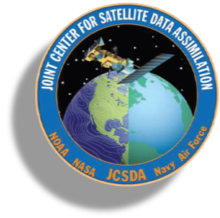With recent advances, JEDI can now perform variational (2DVar) data assimilation for snow depth analysis. The flexibility of JEDI and the generic implementations of data assimilation algorithms (in OOPS) and background error covariances (in SABER, System Agnostic Background Error Representation) enabled a rapid development of this system for snow depth analysis.
JCSDA Closes out DRAS Project with Enormous Success
In 2019 JCSDA was awarded a Disaster Relief Appropriations Supplemental (DRAS) grant from NOAA to accelerate JEDI development and integration, with an emphasis on connecting that development to operational use and systems. The main goals were to accelerate towards use in operational NWS production suites, improving R2O and O2R, and advancing tools for use of observations, all of which were accomplished.
NOAA AOML’s Dr. Pubali Mukherjee Visits JCSDA for Ocean Data Assimilation Collaboration
Recent Fixes in JEDI Making a World of Difference
Bugfix In Halo Updates Highlights Cooperation Between JCSDA Partners
JCSDA's Q4 Review Highlights Exciting Progress Across All Teams
On April 18 the JCSDA team met with our partners at NASA, NOAA, US Navy, US Air Force, and the UK Met Office to celebrate the last quarter of accomplishments and discuss goals for the upcoming quarter and AOP year. Q4 accomplishments included several important bugfixes, new sensors, and several experiments added to SkyLab v8!
Spack-Stack 1.5.0: The New Standard
In 2021, JCSDA and NOAA EMC began exploring Spack as an option for creating a single software stack that could be used for both the JEDI DA software environment and the Unified Forecast System (UFS) ecosystem. Since then both teams have combined their efforts to put together a new stack that works with not only JEDI and the UFS, but also with MPAS, NEPTUNE, the Unified Model and soon GEO.
JEDI Team Takes Another Step Toward Operational Functionality
Last week a combined JCSDA team from the core staff, NOAA, NASA, and the UK Met Office conducted a code sprint for Variational Bias Correction (VarBC) in JEDI’s Unified Forward Operator (UFO). The code sprint worked towards adding the ability to apply bias correction to observations by record, like those from aircraft and ships, in addition to channels.









